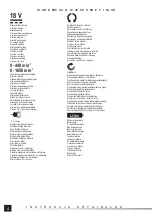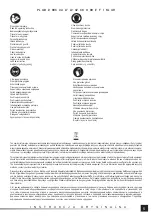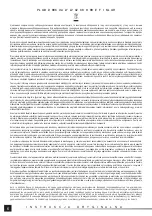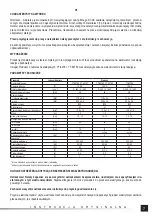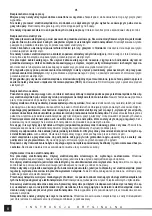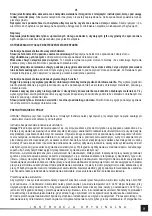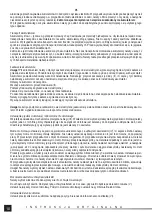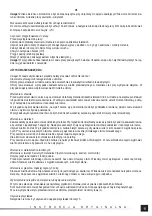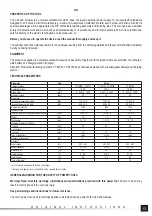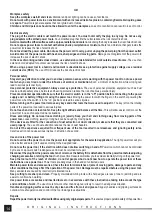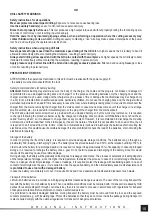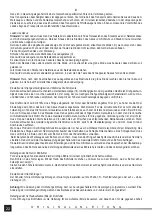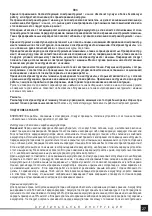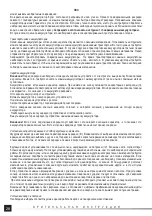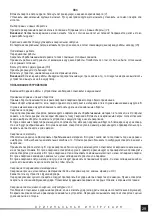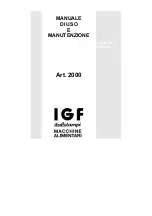
17
GB
O
R
I
G
I
N
A
L
I
N
S
T
R
U
C
T
I
O
N
S
USING OF THE TOOL
Attention!
Use hearing protection while using the tool!
Using right or left rotation
The right rotation should be used while drilling with common dextrorotatory drill bits.
The left rotation should be used if the dextrorotatory drill bit is seized in the material and to remove bolts. In case of removing
bolts, use the lowest rotation.
Drilling in wood
Before making a hole it is recommended to secure the material with clamps or in an anvil, and then to mark the point to be drilled
with a centre punch or a nail. Secure an adequate drill bit in the drill chuck, adjust the torque, connect the tool to the battery and
start drilling.
In case of making holes through the material, it is recommended to place a wooden pad under the material, so as to avoid fraying
of the edge of the hole.
In case of making holes of large diameters it is recommended to drill
fi
rst a smaller guiding hole.
Drilling in metals
Always secure the material to be processed. In case of thin sheet it is recommended to place it on a wooden pad so as to avoid
undesired bends, etc. Then mark the points to be drilled with a centre punch and start drilling.
Use drill bits for steel. In case drilling is done in white cast iron, it is recommended to use sintered carbide drill bits.
In case of making holes of large diameters it is recommended to drill
fi
rst a smaller guiding hole.
In case of drilling in steel, cool the drill bit with machine oil.
In case of drilling in aluminium, cool the drill bit with turpentine or para
ffi
n.
In case of drilling in brass, copper or cast iron, do not use cooling agents. In order to cool the drill bit, it should be often removed
from the material.
Drilling in ceramic materials
Drilling in hard, compact materials (concrete, hard bricks, stone, marble, etc.)
Applies only to hammer tools.
Before the desired hole is made, drill a smaller hole with the hammer function o
ff
. Drill the proper hole with the hammer function
on. Use hammer sintered carbide drill bits in good conditions.
Drilling in glaze, soft bricks, plaster, etc.
Use hammer drill bits. Do not turn the hammer function on (if applicable). During drilling press the tool hard with constant force.
Remove the drill bit from the hole being drilled from time to time, in order to remove dust and waste.
Using the tool to screw bolts in and out
It is recommended to use the lowest rotation and adequate bits.
Bits may be installed directly in the drill chuck or with a special magnetic holder.
In order to unscrew a bolt select the left rotation (L).
Using attachments
The tool must not be used to power working attachments.
Additional information
During work do not exert excessive pressure on the processed material and do not make violent moves, so as to avoid any dam-
age to the working tool and the drill.
Make regular breaks during work.
Do not overstress the tool. The temperature of the external surfaces must not exceed 60
O
C.
Once the work has been concluded, turn the drill o
ff
, remove the battery and carry out maintenance tasks and inspection.
The declared total value of vibrations was measured with a standard method and may be used to compare di
ff
erent tools.
The declared total value of vibrations may be used at the preliminary evaluation of exposition.
Attention! Emission of vibrations during work with the tool may di
ff
er from the declared value, depending on how the tool is used.
Attention! It is required to determine the safety measures to protect the operator, which are based upon evaluation of exposition
under real conditions of operation (including all the stages of the working cycle, e.g. when the tool is o
ff
or idling, as well as when
the tool is on).
MAINTENANCE AND OVERHAUL
ATTENTION! Before any adjustment, technical service or maintenance operations unplug the tool. Once the operations have been
fi
nished, the technical conditions of the tool must be assessed by means of external evaluation and inspection of the following
Содержание YT-82780
Страница 26: ...26 RUS residual current device RCD...
Страница 27: ...27 RUS Li Ion 10 20 500 0 30 50 70...
Страница 28: ...28 RUS II II III IV...
Страница 29: ...29 RUS V R L VI VII VIII...
Страница 30: ...30 RUS L 60 o C 0 3 MPa...
Страница 32: ...32 UA residual current device RCD...
Страница 33: ...33 UA Li Ion 10 20 500 0 30 50 70...
Страница 34: ...34 UA II II III IV V R L VI...
Страница 35: ...35 UA VII VIII...
Страница 36: ...36 UA L 60 o C a E a 0 3 MPa...
Страница 93: ...93 GR RCD RCD...
Страница 94: ...94 GR Li ion 500 0 30 50 70...
Страница 95: ...95 GR IV...
Страница 96: ...96 GR V VI VII VIII...
Страница 97: ...97 GR L 60O C 0 3 MPa...


